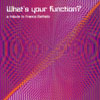"What's Your Function? - A tribute to franco battiato"
Franco Battiato is one of the most unfairly underrated and habituallyignored composer/musicians of the last few decades. The strength of hismaterial plus the careful selection of bands on What's Your Functioneasily rank this in my mental 'top list' of all time favorite tributealbums despite being one of the worst cover/packaging/font jobs ever.Sillyboy
 Battiato's career spans from the 1960s through the present but theoutput in the 1970s is arguably the most influential. 1970s Battiatomusic ranged from short pop tunes to drawn-out pre-prog primitive synthmelodies, and from minimal soundtracks to cut-up mayhems that obviouslyhad a strong influence on some of the best early Nurse With Woundmaterial. It's strangely appropriate, for me at least, that Volcano theBear both opens and closes the album, as it was at Aaron Moore's housethat I first heard, and was completely hooked on the Italian greatFranco Battiato. Since then, I've had Moore buy many Battiato CDs forme—since they're next to completely unavailable and undistributed inthe USA—and I have not been disappointed one bit. Moore eagerly tacklesthe task of singing in Italian on "Da Oriente a Occidente," originallyreleased on the 1973 masterpiece Sulle Corde di Aries as thepulsing vibrophone provides both the beat and main melody. It shouldcome as no surprise that modern psych-rockers Kinski, Cul de Sac, andAcid Mothers Temple can all be found on the collection, eagerly tryingtheir hand at other Battiato tunes, yet rarely do they wander faroff-course from the original tunes. Multi-instrumentalist, musicalgenius, close friend, and unashamed showoff Keith Fullerton Whitman,arguably mis-represented by his Hrvatski alias, fearlessly takes on theItalian vocals with his rendition of "Plancton," complete with flawlessacoustic guitar and nasty analogue synth playing, but even he keepsthings relatively conservative. It's not until fellow Italians Zu vs.Okapi and Jennifer Gentle that the musicians actually take a bit ofliberty with the music, each taking a more aggressive percussiveapproach, and it's probably because these people most likely know theoriginal music more inside and out than anybody else. (I'm going to sayit also helps to fluently understand language the words are in too!)Staying relatively conservative is not a bad thing in this case, as,with any luck, a collection like this could open up some new ears tothe genius of Franco Battiato. Well, we can hope anyway.
Battiato's career spans from the 1960s through the present but theoutput in the 1970s is arguably the most influential. 1970s Battiatomusic ranged from short pop tunes to drawn-out pre-prog primitive synthmelodies, and from minimal soundtracks to cut-up mayhems that obviouslyhad a strong influence on some of the best early Nurse With Woundmaterial. It's strangely appropriate, for me at least, that Volcano theBear both opens and closes the album, as it was at Aaron Moore's housethat I first heard, and was completely hooked on the Italian greatFranco Battiato. Since then, I've had Moore buy many Battiato CDs forme—since they're next to completely unavailable and undistributed inthe USA—and I have not been disappointed one bit. Moore eagerly tacklesthe task of singing in Italian on "Da Oriente a Occidente," originallyreleased on the 1973 masterpiece Sulle Corde di Aries as thepulsing vibrophone provides both the beat and main melody. It shouldcome as no surprise that modern psych-rockers Kinski, Cul de Sac, andAcid Mothers Temple can all be found on the collection, eagerly tryingtheir hand at other Battiato tunes, yet rarely do they wander faroff-course from the original tunes. Multi-instrumentalist, musicalgenius, close friend, and unashamed showoff Keith Fullerton Whitman,arguably mis-represented by his Hrvatski alias, fearlessly takes on theItalian vocals with his rendition of "Plancton," complete with flawlessacoustic guitar and nasty analogue synth playing, but even he keepsthings relatively conservative. It's not until fellow Italians Zu vs.Okapi and Jennifer Gentle that the musicians actually take a bit ofliberty with the music, each taking a more aggressive percussiveapproach, and it's probably because these people most likely know theoriginal music more inside and out than anybody else. (I'm going to sayit also helps to fluently understand language the words are in too!)Staying relatively conservative is not a bad thing in this case, as,with any luck, a collection like this could open up some new ears tothe genius of Franco Battiato. Well, we can hope anyway.
 Battiato's career spans from the 1960s through the present but theoutput in the 1970s is arguably the most influential. 1970s Battiatomusic ranged from short pop tunes to drawn-out pre-prog primitive synthmelodies, and from minimal soundtracks to cut-up mayhems that obviouslyhad a strong influence on some of the best early Nurse With Woundmaterial. It's strangely appropriate, for me at least, that Volcano theBear both opens and closes the album, as it was at Aaron Moore's housethat I first heard, and was completely hooked on the Italian greatFranco Battiato. Since then, I've had Moore buy many Battiato CDs forme—since they're next to completely unavailable and undistributed inthe USA—and I have not been disappointed one bit. Moore eagerly tacklesthe task of singing in Italian on "Da Oriente a Occidente," originallyreleased on the 1973 masterpiece Sulle Corde di Aries as thepulsing vibrophone provides both the beat and main melody. It shouldcome as no surprise that modern psych-rockers Kinski, Cul de Sac, andAcid Mothers Temple can all be found on the collection, eagerly tryingtheir hand at other Battiato tunes, yet rarely do they wander faroff-course from the original tunes. Multi-instrumentalist, musicalgenius, close friend, and unashamed showoff Keith Fullerton Whitman,arguably mis-represented by his Hrvatski alias, fearlessly takes on theItalian vocals with his rendition of "Plancton," complete with flawlessacoustic guitar and nasty analogue synth playing, but even he keepsthings relatively conservative. It's not until fellow Italians Zu vs.Okapi and Jennifer Gentle that the musicians actually take a bit ofliberty with the music, each taking a more aggressive percussiveapproach, and it's probably because these people most likely know theoriginal music more inside and out than anybody else. (I'm going to sayit also helps to fluently understand language the words are in too!)Staying relatively conservative is not a bad thing in this case, as,with any luck, a collection like this could open up some new ears tothe genius of Franco Battiato. Well, we can hope anyway.
Battiato's career spans from the 1960s through the present but theoutput in the 1970s is arguably the most influential. 1970s Battiatomusic ranged from short pop tunes to drawn-out pre-prog primitive synthmelodies, and from minimal soundtracks to cut-up mayhems that obviouslyhad a strong influence on some of the best early Nurse With Woundmaterial. It's strangely appropriate, for me at least, that Volcano theBear both opens and closes the album, as it was at Aaron Moore's housethat I first heard, and was completely hooked on the Italian greatFranco Battiato. Since then, I've had Moore buy many Battiato CDs forme—since they're next to completely unavailable and undistributed inthe USA—and I have not been disappointed one bit. Moore eagerly tacklesthe task of singing in Italian on "Da Oriente a Occidente," originallyreleased on the 1973 masterpiece Sulle Corde di Aries as thepulsing vibrophone provides both the beat and main melody. It shouldcome as no surprise that modern psych-rockers Kinski, Cul de Sac, andAcid Mothers Temple can all be found on the collection, eagerly tryingtheir hand at other Battiato tunes, yet rarely do they wander faroff-course from the original tunes. Multi-instrumentalist, musicalgenius, close friend, and unashamed showoff Keith Fullerton Whitman,arguably mis-represented by his Hrvatski alias, fearlessly takes on theItalian vocals with his rendition of "Plancton," complete with flawlessacoustic guitar and nasty analogue synth playing, but even he keepsthings relatively conservative. It's not until fellow Italians Zu vs.Okapi and Jennifer Gentle that the musicians actually take a bit ofliberty with the music, each taking a more aggressive percussiveapproach, and it's probably because these people most likely know theoriginal music more inside and out than anybody else. (I'm going to sayit also helps to fluently understand language the words are in too!)Staying relatively conservative is not a bad thing in this case, as,with any luck, a collection like this could open up some new ears tothe genius of Franco Battiato. Well, we can hope anyway. samples:
- Kinski - Propiedad Prohibida
- Jennifer Gentle - Meccanica
- Land of Nod - Aries



